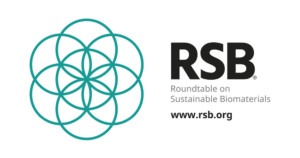
Marcelle Peuckert, Business Development Director at RSB
In each issue of the Bioplastics Bulletin, we present 5 facts about a member of European Bioplastics. In this issue, Marcelle Peuckert, Business Development Director at the Roundtable on Sustainable Biomaterials (RSB) shares some information on one of the world’s most credible international sustainability and biomaterials certification.
5 facts about RSB
- RSB is a global, multi-stakeholder independent organisation that drives the development of a new world bioeconomy through sustainability solutions, certification, innovation and collaborative partnerships. RSB provides credible tools and solutions for sustainability that mitigate business risk and contribute to achieving the UN’s Sustainable Development Goals. RSB has the world’s most trusted, peer-reviewed, global certification standard for sustainable biomaterials, biofuels and biomass production.
- The RSB has members from a worldwide movement of businesses, NGOs, academics, government and UN organisations that all have the same goal of supporting and driving best practice for sustainable biomaterial production. The collaboration of over 60 diverse organisations within the RSB all have a vision to ensure global sustainability certification for all biomaterials, including bioplastics.
- RSB delivers workable solutions and offers a range of services to support companies across all sectors, including companies producing and selling bioplastics, investors, development agencies, NGOs, and governments in assessing and implementing sustainability, and in applying the principles of the RSB Standard to their operations, projects and policy development.
- RSB certification can help companies demonstrate their commitment to a credible bioeconomy based on ethical, sustainable and credibly-sourced biomaterials. In addition to certification of over 50 industrial facilities and 56 784 hectares of farmland, RSB is providing solutions for companies worldwide in the bioplastics, aviation and broader biomaterials sectors. RSB is engaged in public-private partners to establish sustainable supply chains in Brazil, South Africa and Mexico, and is working with government agencies in Australia, China and the USA to streamline implementation of RSB certification on the ground.
- The RSB standard is considered best in class and offers assurance on critical issues such as food security, zero deforestation, land rights, water and Greenhouse Gas reductions, etc. RSB’s risk-based approach ensures that certification is adapted to local realities and high risk issues are given priority. RSB recognises other credible certification standards and as well as national requirements and practices for sustainability thus facilitating certification for companies.
